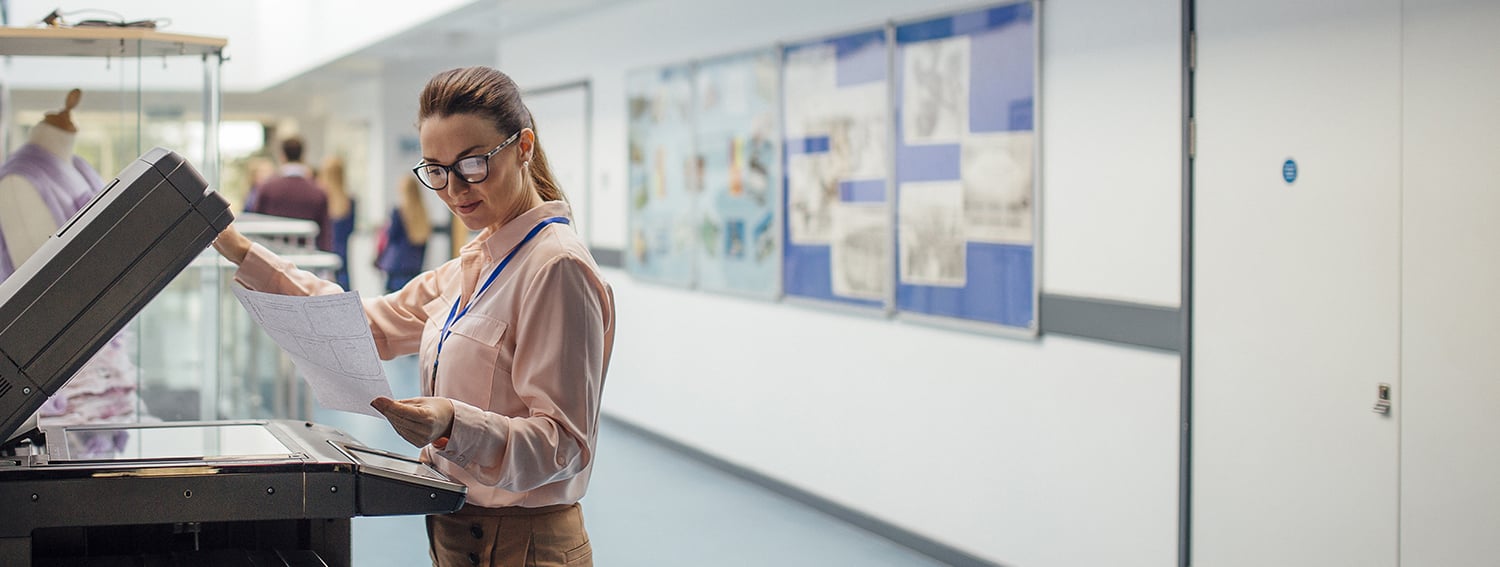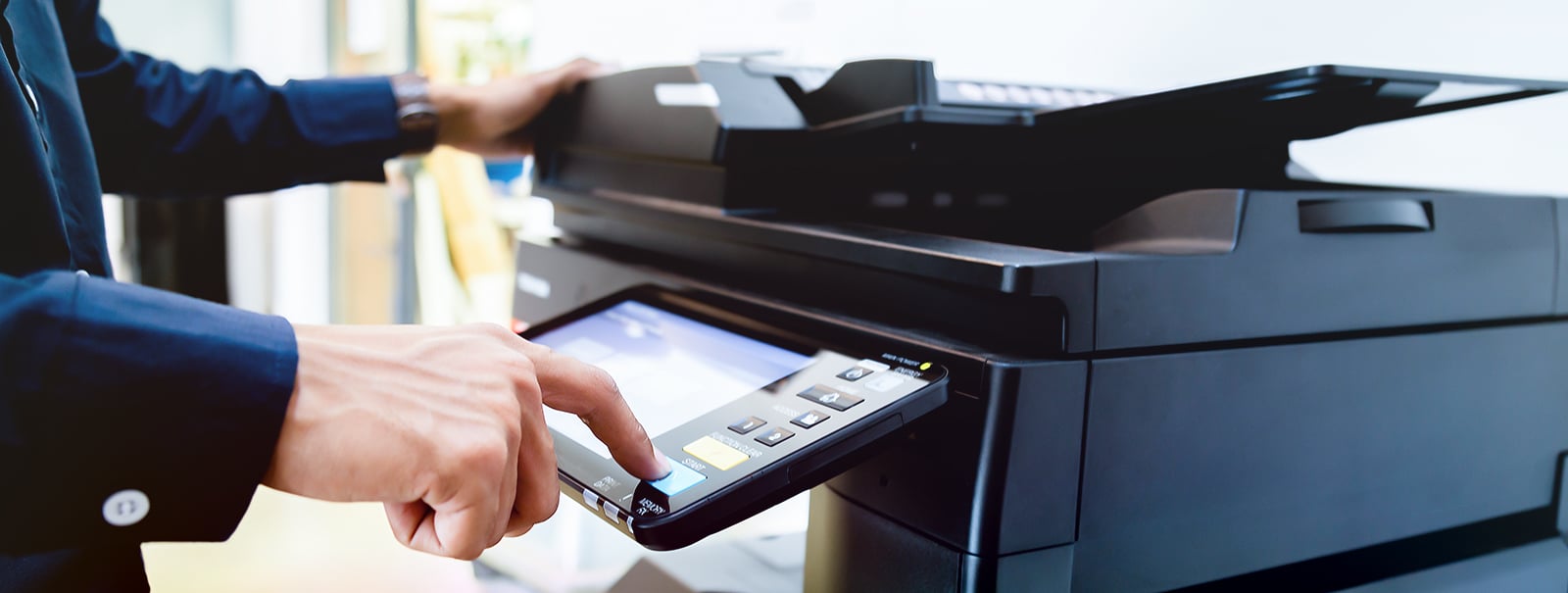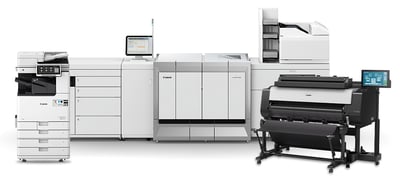Why Printer Standardization Is Superior to Managed Print Services
At UBEO, we believe managed print is a failed strategy. Managed print is designed to flip your company into a long-term agreement. It is a way for print service providers to get their foot in the door, but they cannot deliver what is promised.
Let’s look at the problems of managed print and the smarter solution of standardization.

What is Managed Print?
Managed print services (MPS) is an outsourced solution where a third-party provider takes responsibility for a company's existing print infrastructure, including managing and optimizing their fleet of printers, copiers, and multifunction devices.
While MPS can sometimes offer benefits like cost control, improved efficiency, and reduced administrative burden, it may not always be as advantageous as printer standardization. One of the biggest challenges of MPS is that it attempts to make the most out of the setup you already have — even if it isn’t the best setup for your business.
Managed Print vs. Printer Standardization
Why choose a managed print service? Managed print providers claim to take all your printer headaches away by putting that burden of your fleet on the service provider — but it NEVER works!
There is no way any company can stock all the toner cartridges and parts needed to keep several different models running smoothly. Managed print becomes a break-fix process of diagnosing problems, ordering parts and rescheduled calls.
Meanwhile, your device is down for days.
Printer standardization is a strategy that minimizes the number of device models in your environment. The goal is to streamline your operations and make your system as user-friendly as possible. With printer standardization, your service provider assesses your setup, provides recommendations to optimize your print environment, and helps you keep everything up to date. Still, most businesses don’t know that printer standardization is even an option.
What is Printer Standardization?
Printer standardization is the process of determining a selection of devices, policies, software, and maintenance practices with the ultimate goal of increasing efficiency, enhancing workflows, and cutting costs. Printer standardization is especially important in large organizations with multiple printers across various departments.
It helps control costs, reduce waste, improve security, and ensure that the printing infrastructure meets business needs consistently. Additionally, it simplifies troubleshooting and support efforts by providing a common framework for managing and maintaining printers.
Standardizing your printer and copier network includes:
- User Setup: Establishing consistent user profiles, user authentication methods, access controls, and permissions to help maintain security, streamline setup, and improve accountability in print operations.
- Printer Drivers: Printers, regardless of make or model, should be able to communicate with computers using a consistent set of commands and features, facilitating seamless and predictable printing experiences.
- Security Settings: Consistent security helps protect sensitive data sent to and stored on printers, including user authentication, Follow Me printing, access controls, and encryption.
- Document Management: Implementing standardized practices around filing, scanning, storing, and sharing include file naming conventions, version control, and archiving procedures, to ensure that printed documents are organized, accessible, and compliant with regulatory requirements.
- Maintenance and Support: Defining regular maintenance schedules and support procedures to keep printers in optimal working condition and minimize downtime.
- Print Policies: Establishing policies for print job prioritization, cost control, and responsible printing practices.
- Print Monitoring: Implementing centralized print management and monitoring solutions to track print volumes, detect issues, and optimize resource allocation.

Why Do You Need Standardization for Your Print Environment?
Print fleets grow up organically over time. New devices are added to the network which creates another print driver to manage and more toner cartridges to stock. When that unit breaks down and is no longer worth replacing, the money invested in back-up toner is wasted. IT departments cannot effectively enforce print policies over a vast array of devices and drivers.
The result is an unmanageable system with unchecked cost.
This is why UBEO offers printer standardization based on a business technology assessment (BTA). We take time to identify your existing setup and recommend a print environment that best fits your goals, processes, and needs.
The Benefits of Printer Fleet Standardization
By standardizing your fleet, the benefits are tremendous:
- Users can move seamlessly from one device to the next
- No need for closets full of back-up toner cartridges
- Simplified setup and print driver management
- Reduced burden on IT and streamlined support
- Easier to establish print standardization policies
- Increased print insights for budget and security
- Predictable expenses and print forecasting
And so much more....
Talk to UBEO About Print Standardization
We’re the industry-leading resource for standardized print environments and optimizing your business technology setup. Trust UBEO to provide the expert knowledge you need and help you choose the print environment right for you.
UBEO provides better print insights, real-time control, and tailored solutions.




